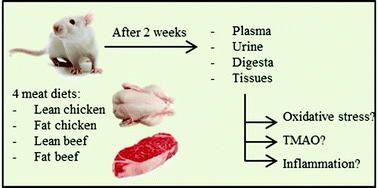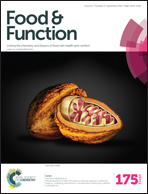Short-term beef consumption promotes systemic oxidative stress, TMAO formation and inflammation in rats, and dietary fat content modulates these effects†
Abstract
A high consumption of red and/or processed meat is associated with a higher risk to develop several chronic diseases in which oxidative stress, trimethylamine-N-oxide (TMAO) and/or inflammation are involved. We aimed to elucidate the effect of white (chicken) vs. red (beef) meat consumption in a low vs. high dietary fat context (2 × 2 factorial design) on oxidative stress, TMAO and inflammation in Sprague-Dawley rats. Higher malondialdehyde (MDA) concentrations were found in gastrointestinal contents (up to 96% higher) and colonic tissues (+8.8%) of rats fed the beef diets (all P < 0.05). The lean beef diet resulted in lower blood glutathione, higher urinary excretion of the major 4-hydroxy-nonenal metabolite, and higher plasma C-reactive protein, compared to the other dietary treatments (all P < 0.05). Rats on the fat beef diet had higher renal MDA (+24.4% compared to all other diets) and heart MDA (+12.9% compared to lean chicken) and lower liver vitamin E (−26.2% compared to lean chicken) (all P < 0.05). Rats on the fat diets had lower plasma vitamin E (−23.8%), lower brain MDA (−6.8%) and higher plasma superoxide dismutase activity (+38.6%), higher blood glutathione (+16.9%) (all P < 0.05) and tendency to higher ventral prostate MDA (+14.5%, P = 0.078) and prostate weight (+18.9%, P = 0.073), compared to rats on the lean diets. Consumption of the beef diets resulted in higher urinary trimethylamine (4.5-fold) and TMAO (3.7-fold) concentrations (P < 0.001), compared to the chicken diets. In conclusion, consumption of a high beef diet may stimulate gastrointestinal and/or systemic oxidative stress, TMAO formation and inflammation, depending on the dietary fat content and composition.


 Please wait while we load your content...
Please wait while we load your content...